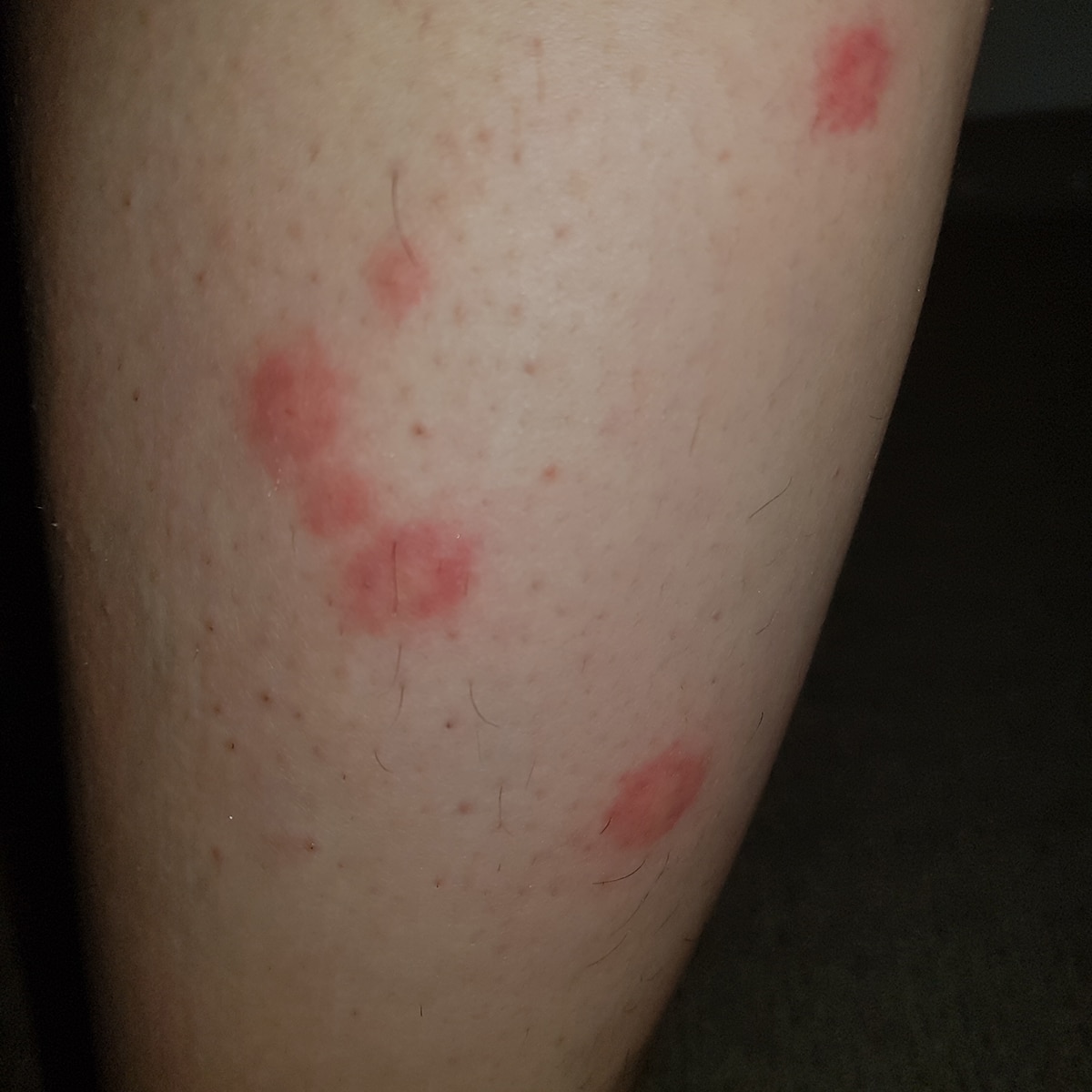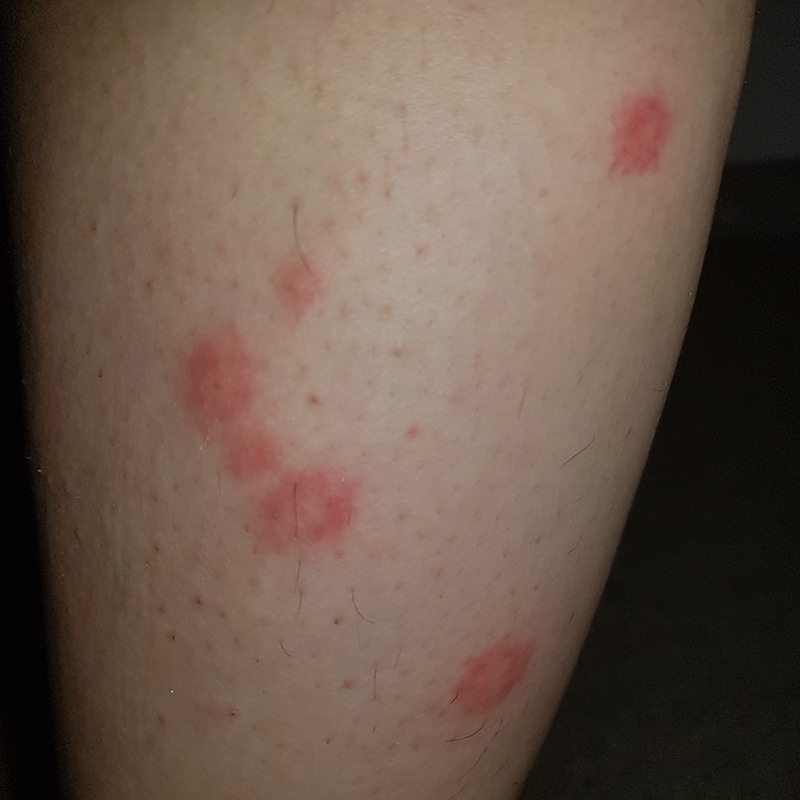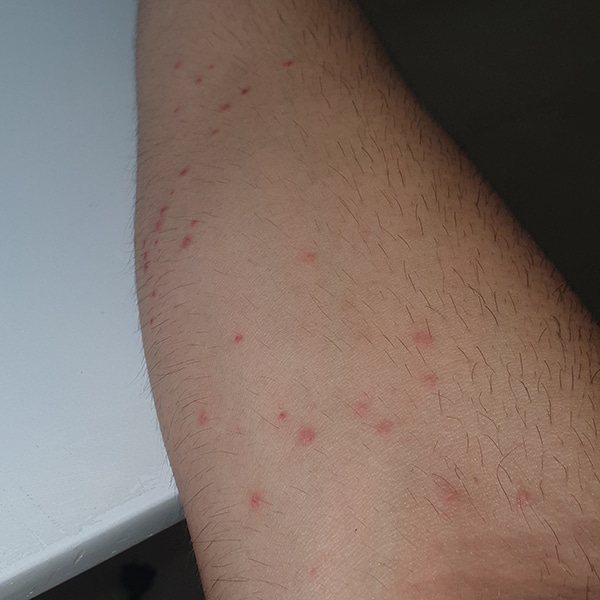
In the article
Last Updated on 14/10/2025 by Tony Abrahams
Bed bug bites can be uncomfortable and frustrating, but knowing how to identify, treat, and prevent them is key to managing the problem. In this guide, we’ll cover everything you need to know about bed bug bites, including symptoms, treatment options, and prevention tips.
How to Identify Bed Bug Bites

Bed Bug Bites On Leg
Bed bug bites are often mistaken for bites from other insects, but they have distinct characteristics:
- Appearance:
- On lighter skin tones, bites appear as small, red, itchy bumps.
- On darker skin, they may look purple or darker and can be harder to see.
- Pattern:
- Bites often appear in a line, zigzag, or cluster.
- Location:
- Commonly found on exposed skin areas like the face, neck, arms, and hands.
Pro Tip: If you wake up with bites in a linear pattern, bed bugs are likely the culprit.
Do Bed Bug Bites Affect Everyone the Same Way?
Not everyone reacts to bed bug bites in the same way. Reactions depend on an individual’s sensitivity and immune system:
- Some people develop red, itchy welts.
- Others may have no visible reaction at all.
- In rare cases, severe allergic reactions (e.g., swelling, fever, difficulty breathing) can occur. If this happens, seek medical attention immediately.
Common Symptoms of Bed Bug Bites

Bed Bug Bite On Forearm
While reactions vary, most people experience:
- Itchiness: The most prominent symptom, often leading to discomfort.
- Inflammation: Raised, red bumps resembling a rash or pimple.
- Burning Sensation: Some report a mild burning feeling at the bite site.
- Delayed Reactions: Symptoms may not appear until days after the bite.
Severe Reactions: In rare cases, individuals may experience blisters, fever, or irregular heartbeat. If symptoms worsen, consult a doctor.
Bed Bug Bites vs. Other Insect Bites
Bed bug bites are often confused with bites from mosquitoes, fleas, or spiders. Here’s how to tell the difference:
| Insect | Bite Characteristics |
| Bed Bugs | Clusters or lines of red, itchy bumps on exposed skin. |
| Mosquitoes | Random, isolated bites with a central puncture mark. |
| Fleas | Small red dots, often clustered around ankles and lower legs. |
| Spiders | Single bites with redness, swelling, and sometimes a blister. |
How to Treat Bed Bug Bites
Most bed bug bites heal within 1-2 weeks. To relieve symptoms:
- Cleanse the Area: Wash bites with soap and water to prevent infection.
- Apply Anti-Itch Creams: Use over-the-counter hydrocortisone or calamine lotion.
- Use a Cold Compress: Reduce swelling and soothe itching with an ice pack.
- Avoid Scratching: Scratching can lead to infections.
When to See a Doctor: If itching persists or bites become infected, consult a healthcare provider. They may prescribe stronger creams or antibiotics.
What Are Bed Bugs?

Bed bug feeding on blood
Bed bugs are small, reddish-brown insects about the size of an apple seed. They:
- Feed on human blood at night.
- Hide in cracks, crevices, mattresses, and furniture during the day.
- Do not transmit diseases but can cause significant discomfort.
How to Get Rid of Bed Bugs Instantly & Long Term
Forget expensive pest controllers and chemical sprays, there’s a faster, cheaper, and easier way to stop bed bug bites for good. It’s called the Bed Bug Barrier Isolation Method.
Instead of treating the entire room (which is what pest control companies charge hundreds for), you only need to treat the “bed”, the place bed bugs must reach to feed. Once you isolate the bed properly, every bed bug in the room is forced to cross your defences to get to you, and that’s where they die.
Here’s how it works:
- Steam-kill instantly: Use a Bed Bug Steamer to kill visible bugs and eggs on the bed frame, seams, and cracks.
- Seal your mattress: Fit a Bed Bug Proof Mattress Cover to trap existing bugs inside and protect against new ones.
- Wash your bed linen: Wash and heat-dry all sheets, pillowcases, and blankets on high heat. You only need to wash your bed linen — nothing else — saving you time and money.
- Dust with Diatomaceous Earth (DE): Apply DE powder on the bed frame and inside the Floor Barriers under each leg. This kills bed bugs long-term as they try to reach you.
- Isolate the bed: Keep it at least 30cm from walls and furniture so bugs can only reach you through the barriers — and never make it up.
You can sleep in the bed the same night. No toxic fumes. No moving furniture. No waiting for pest control to “come back in two weeks.” Just one simple setup that kills every bed bug in the room over time and keeps them from ever reaching you again.
How to Prevent Bed Bug Infestations
Prevention is key to avoiding bed bugs and saving yourself from a lot of stress later.
- Inspect Second-Hand Items: Thoroughly clean and inspect used furniture, bedding, or clothing before bringing them home. Bed bugs often hitchhike on pre-owned items.
- Be Careful of Visitors and Neighbours: Bed bugs can easily spread from nearby units or visiting guests. If you live in an apartment or shared building, use bed leg barriers and mattress covers to block them from reaching your bed. Encourage guests to keep luggage off beds or couches, and wash bedding after they leave.
- Travel Smart: Keep luggage off hotel floors and beds, inspect it before returning home, and wash clothes on hot immediately after travel.
- Maintain Cleanliness: Reduce clutter to eliminate hiding spots and make inspections easier.
By staying cautious about what (and who) enters your home, you’ll greatly reduce the risk of an infestation starting in the first place.
FAQs About Bed Bug Bites
1. Do bed bug bites spread?
No, bed bug bites themselves don’t spread from person to person. However, scratching can break the skin and cause irritation or infection, which might make the area look worse.
2. Can bed bugs live in your hair?
No, bed bugs don’t live in hair. They prefer dark, hidden spaces like mattresses, bed frames, and furniture seams. They only come out to feed and then retreat back to hiding spots.
3. How long do bed bug bites last?
Most bites heal within 1–2 weeks. If you have sensitive skin or an allergic reaction, the redness and itching can linger a bit longer, but they usually fade with time.
Final Thoughts
Bed bug bites can be uncomfortable, but with proper care, they are manageable. By learning how to identify, treat, and prevent bed bugs, you can protect yourself and your home. If you suspect an infestation, act quickly to stop the problem from spreading.
Have questions or tips about bed bugs? Share them in the comments below!
Are You Looking for a Fast, Safe, Organic DIY Treatment?
Watch Our DIY Treatment Video For An Ensemble Bed
Watch Our DIY Treatment Video For A Bed with Slats
If you have enjoyed this article, then you might like to read Bed Bug Bites in Australia.
Sources
Health VIC Pest Control
Health Harvard (bed bug bites how to identify)



Val Harrington says
Do I need powder as well as mattress cover
Tony Abrahams says
Hi Val! Great question. A mattress cover is essential, but it only works if the bed bugs are only on the mattress.
If bed bugs are elsewhere—like in your bed frame, you’ll need an additional treatment like our Bed Bug Killer powder, Diatomaceous Earth (DE) powder to target those areas. The powder creates a barrier that kills bed bugs as they crawl across it, preventing them from reinfesting your mattress or spreading further.
So, while the cover traps bugs already in the mattress, the powder ensures you’re tackling any bugs hiding in other spots. For best results, we recommend using both the mattress cover, bed leg barriers and powder together. This combo provides instant and long-term protection! Regards BBB Team
Jennu says
Do bed bug bites go away on their own, or is treatment required for full recovery?
Tony Abrahams says
Hi Jennu. Bed bug bites usually go away on their own in a few days to a week. The itching and redness just fade away. But if you want to feel better faster, you can use things like anti-itch cream or take antihistamines for allergic reactions. If you scratch too much and the bites get infected, you might need to see a doctor. So, you don’t have to get treatment, but it can definitely help make the bites feel better quicker!Regards BBB
Narelle says
Hi team. I’ve just found a bed bug but I don’t have any bite marks. I don’t understand why I haven’t been bitten.
Tony Abrahams says
Hi Narelle. It’s possible to have bed bugs without getting bite marks. Some people don’t react to the bites, so no visible marks appear. Bed bugs also don’t bite every night. Even if you haven’t been bitten, it’s important to take action now to prevent an infestation from spreading. Set up bed bug traps, mattress barriers, and treat the area to protect yourself
Michelle MacLean says
Very very keen to try this bed bug killer on mattresses and bases and lounges even pls
Tony Abrahams says
Hi Michelle. Please don’t use the powder on your mattress. Use a mattress cover instead. You can use it on your bases and lounges.
Bed Bug Barrier says
Hi Gregory
Flea bombs do not kill bed bugs.
Regards
Tony